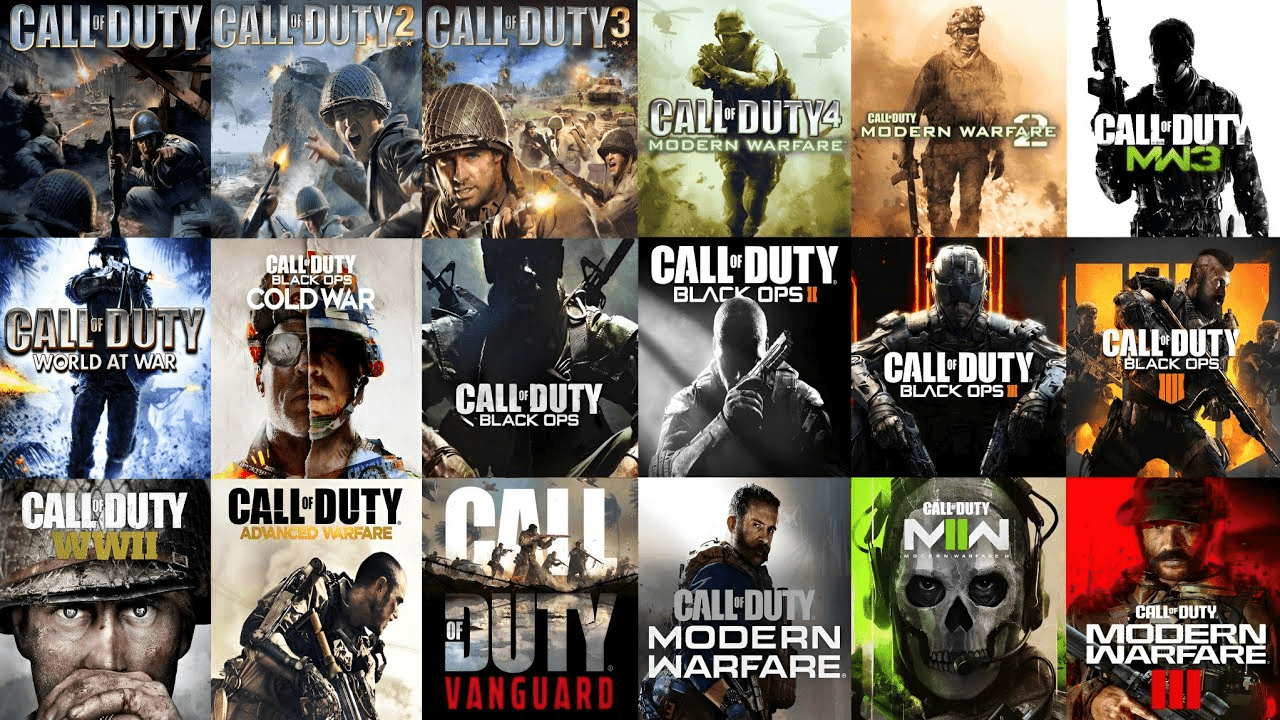Call of Duty games have been a cornerstone of the first-person shooter (FPS) genre since their inception. With a rich history spanning over two decades, the Call of Duty series has evolved from its World War II origins to explore various settings and futuristic scenarios. This blog provides an in-depth look at the Call of Duty franchise, highlighting its major titles, gameplay innovations, and the impact it has had on the gaming industry. Whether you’re a long-time fan or new to the series, this guide will give you a comprehensive understanding of Call of Duty games.
Origins and Early Success
Call of Duty was first released on October 29, 2003, developed by Infinity Ward and published by Activision. The original game set the stage for what would become one of the most successful franchises in gaming history. Here’s a look at how the series evolved from its early days:
- Call of Duty (2003): Set during World War II, this title focused on realistic combat and historical accuracy. It was well-received for its immersive experience and was a major success for its time, laying the foundation for future titles.
- Call of Duty 2 (2005): Building on the success of the original, Call of Duty 2 improved graphics and gameplay mechanics while continuing the WWII theme. The game was praised for its cinematic approach and immersive environments.
- Call of Duty 3 (2006): This installment refined the gameplay with improved graphics and multiplayer features. It also continued the WWII setting but with a focus on the Normandy breakout.
Key Features of Call of Duty Games
Engaging Single-Player Campaigns
One of the hallmarks of Call of Duty games has been their engaging single-player campaigns. These narratives often feature cinematic storytelling, historical events, and intense action sequences. Each game offers a unique storyline, ranging from WWII battles to modern-day conflicts and futuristic scenarios.
Innovative Multiplayer Modes
Multiplayer modes are a core component of Call of Duty games, providing players with competitive and cooperative experiences. Key features include:
- Classic Modes: Traditional modes like Team Deathmatch, Domination, and Search & Destroy have been staples of the multiplayer experience, offering fast-paced and strategic gameplay.
- Special Modes: Over the years, Call of Duty has introduced various special modes, such as Zombies, Extinction, and Blackout. These modes offer unique gameplay experiences and have become fan favorites.
- Battle Royale: The introduction of the battle royale genre with Blackout and Warzone brought a new level of competition and strategic depth to the multiplayer experience. These modes feature large maps, a shrinking play area, and a focus on survival.
Detailed Graphics and Realism
Call of Duty games are known for their high-quality graphics and attention to detail. From realistic weapon models and environments to immersive sound design, the franchise strives to deliver a visually and aurally compelling experience. The use of cutting-edge technology ensures that each game pushes the boundaries of graphical fidelity and realism.
Extensive Weapon Customization
Weapon customization is a key feature in Call of Duty games, allowing players to tailor their loadouts to their preferences. The Pick 10 system, introduced in Black Ops II, allows players to customize their weapons with various attachments, perks, and equipment. This level of customization adds depth to the gameplay and enables players to create loadouts that suit their playstyle.
Regular Updates and Community Engagement
The Call of Duty franchise is known for its commitment to regular updates and community engagement. Post-launch support includes new content, balancing changes, and seasonal events. The franchise also actively engages with its community through social media, forums, and in-game events, ensuring that players remain engaged and invested in the game.
The Beginnings: World War II Era
Call of Duty (2003)
The franchise debuted in 2003 with the original Call of Duty, developed by Infinity Ward and published by Activision. This first entry was set during World War II, offering players a gritty and immersive experience of the war from multiple perspectives—American, British, and Soviet soldiers. The game was celebrated for its intense gameplay, historical accuracy, and the innovative “shellshock” effect, which simulated the disorientation of nearby explosions.
Call of Duty 2 (2005) and Call of Duty 3 (2006)
Following the success of the original, Call of Duty 2 continued the WWII theme with improved graphics, more expansive campaigns, and refined multiplayer modes. The game became a critical and commercial success, praised for its realism and immersive atmosphere.
Call of Duty 3, developed by Treyarch, was released a year later and focused exclusively on the European Theatre of World War II, particularly the Normandy Breakout. Although it received mixed reviews for not innovating significantly, it still provided a robust and engaging experience for fans of the genre.
Call of Duty 4: Modern Warfare (2007)
A pivotal moment in the franchise’s history came with Call of Duty 4: Modern Warfare, which shifted the setting from WWII to contemporary conflicts. This game introduced a more complex narrative, featuring modern military tactics and advanced technology. It also revolutionized multiplayer gaming with features like customizable loadouts, killstreaks, and perks, setting a new standard for online shooters.
The storyline of Modern Warfare, focusing on a fictional conflict involving Russia and the Middle East, was praised for its compelling characters and cinematic quality. The game’s success was monumental, making it one of the best-selling video games of all time and significantly boosting the franchise’s popularity.
Modern Warfare Series Continuation
- Call of Duty: Modern Warfare 2 (2009): This sequel expanded on the original’s success with an even more engaging story and more elaborate multiplayer options. Notable for its controversial “No Russian” mission, it pushed boundaries in storytelling and gameplay.
- Call of Duty: Modern Warfare 3 (2011): Concluding the trilogy, this installment wrapped up the story arcs from the previous games. It introduced new game modes, such as the cooperative Survival mode, and maintained the series’ high standards for multiplayer engagement.
Call of Duty: Black Ops Series
The Black Ops sub-series, developed by Treyarch, introduced a darker, more psychological narrative compared to the Modern Warfare series. Set during the Cold War era, it explored covert operations and conspiracies.
- Call of Duty: Black Ops (2010): Featuring the protagonist Alex Mason, the game delved into mind control experiments and espionage, with a significant focus on the Vietnam War. The Zombies mode also became a staple feature, offering a cooperative experience against waves of undead enemies.
- Call of Duty: Black Ops II (2012): Notable for its branching storyline and multiple endings, this game introduced futuristic technology and warfare, while still maintaining a connection to the Cold War era. The multiplayer mode introduced the “Pick 10” system, allowing extensive customization.
- Call of Duty: Black Ops III (2015) and IV (2018): These titles continued to explore futuristic settings and enhanced the Zombies mode. Black Ops IV notably did away with a traditional single-player campaign, instead offering a multiplayer-only experience, including the battle royale mode “Blackout.”
Diversification with Different Eras and Themes
The franchise continued to explore various historical and futuristic themes:
- Call of Duty: World at War (2008): Returning to the WWII setting, this game introduced a darker tone and was the first to feature the Zombies mode.
- Call of Duty: Ghosts (2013): Set in a post-apocalyptic future, it introduced the Extinction mode, where players fought against an alien invasion.
- Call of Duty: Advanced Warfare (2014): Introduced futuristic exoskeletons and advanced technology, significantly altering movement and combat mechanics.
- Call of Duty: Infinite Warfare (2016): Set in a distant future with space warfare, it was notable for its ambitious setting and advanced tech gameplay, though it received mixed reviews for deviating too far from the franchise’s roots.
The Rise of Battle Royale: Call of Duty: Warzone
The battle royale genre, popularized by games like PUBG and Fortnite, saw the Call of Duty games series entering the fray with Call of Duty: Warzone in 2020. Initially tied to Call of Duty: Modern Warfare (2019), Warzone was a free-to-play mode that quickly became a standalone phenomenon.
Warzone offered a massive, continually evolving map with up to 150 players per match. Its integration with Call of Duty: Modern Warfare and subsequent titles like Black Ops Cold War and Vanguard allowed for a unique cross-title experience, with weapons and operators available across different games.
The success of Warzone marked a new chapter for Call of Duty games, expanding the franchise’s reach and solidifying its presence in the battle royale space.
Community and Cultural Impact
Call of Duty games Esports and Competitive Scene
Call of Duty has long been a staple in the esports community, with numerous tournaments and a dedicated player base. The establishment of the Call of Duty League (CDL) in 2020 brought a formal structure to its competitive scene, featuring franchised teams and a regular season, culminating in playoffs and a championship.
The competitive nature of Call of Duty games, especially the tight-knit multiplayer community, has fostered a vibrant esports culture. This includes amateur leagues, professional competitions, and a robust ecosystem of streamers and content creators.
Community Engagement and Content Creation
The Call of Duty community is vast and diverse, encompassing players of all ages and backgrounds. The franchise’s regular updates, seasonal events, and integration of new content keep the community engaged. Social media platforms, YouTube, and Twitch are filled with Call of Duty content, from gameplay tips and tricks to in-depth analysis and entertainment.
Content creators play a significant role in maintaining the game’s popularity, providing tutorials, gameplay showcases, and streaming live matches. This engagement not only helps in retaining the player base but also attracts new players.
The Future of Call of Duty Games
With the advent of next-generation consoles like the PlayStation 5 and Xbox Series X, Call of Duty games are poised to take advantage of advanced hardware capabilities. Enhanced graphics, faster loading times, and more immersive experiences are on the horizon, promising an even more engaging gameplay experience.
Innovation and Expansion
The future of Call of Duty games will likely continue to blend traditional elements with innovative gameplay mechanics. The franchise may explore new settings and narratives, including further expansions into futuristic warfare or potentially even revisiting historical contexts with a fresh perspective.
The integration of VR and AR technologies, although speculative, could revolutionize the series by offering more immersive gameplay experiences. Additionally, the expansion of Warzone and similar modes suggests a continued emphasis on evolving, dynamic multiplayer experiences.
Maintaining Community Engagement
Activision and the developers at Infinity Ward, Treyarch, Sledgehammer Games, and Raven Software are expected to continue their efforts in engaging the Call of Duty games community. This includes regular updates, community events, and feedback loops that help shape the game’s future. The franchise’s ability to adapt and respond to player feedback has been crucial to its sustained success.
Conclusion
The Call of Duty games franchise has been a defining force in the gaming industry for nearly two decades. Its evolution from a WWII shooter to a multifaceted series encompassing modern, futuristic, and even fantastical elements showcases its versatility and broad appeal. Each iteration has brought something new to the table, whether through groundbreaking graphics, innovative gameplay mechanics, or immersive storytelling.
The impact of Call of Duty games extends beyond the screen, influencing esports, content creation, and gaming culture at large. As the franchise continues to grow and evolve, it remains a central pillar of the FPS genre, consistently setting standards and pushing boundaries.
Looking ahead, the future of Call of Duty games promises even more innovation, community engagement, and groundbreaking experiences. Whether through next-gen advancements, new narrative explorations, or expanded multiplayer modes, Call of Duty will continue to be a cornerstone of the gaming world, captivating players and shaping the industry for years to come.

























